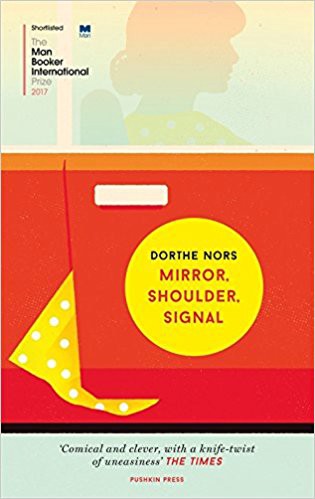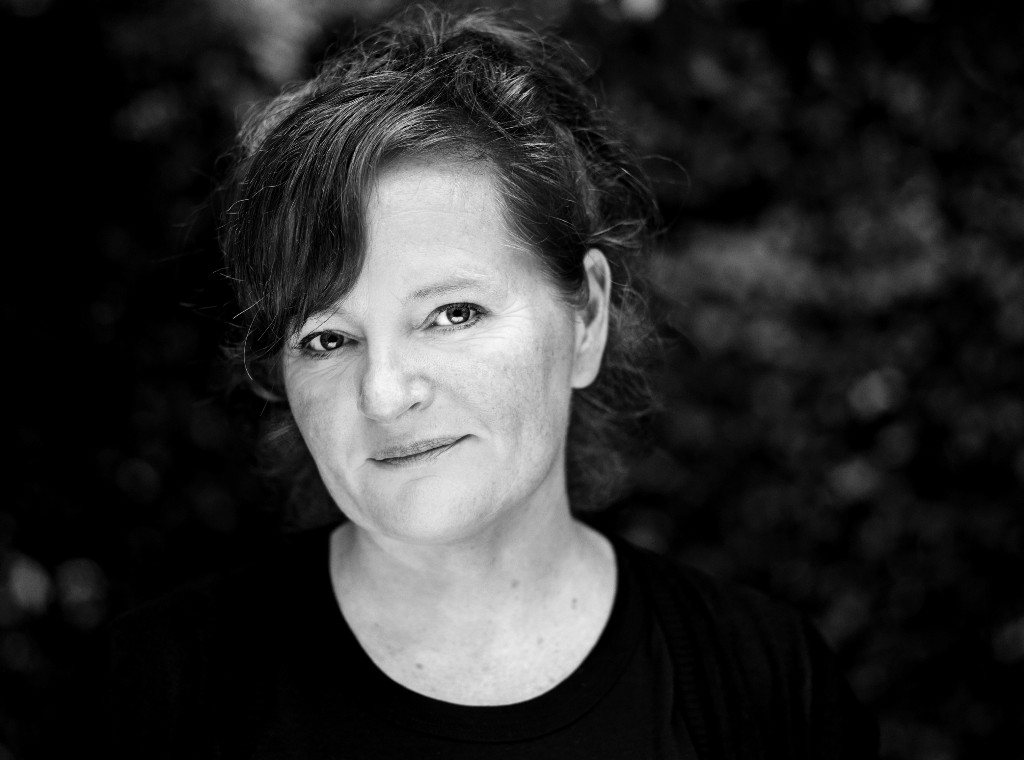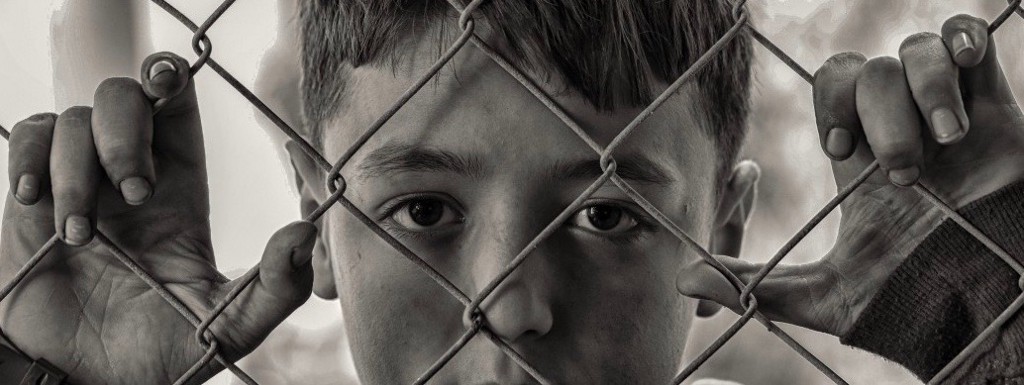interviews
How to Translate a Murder
Dorthe Nors‘ “Mirror, Shoulder, Signal” is about a crime fiction translator in crisis

Dorthe Nors is a writer in motion: at home in the city and the countryside, observant of the changes in her surroundings, of the minutiae in the relationship she holds with the environment. It makes her more alert, creative in her work. Born in Herning, on the Danish peninsula of Jutland, she can be seen wandering on the West coast near Ringkøbing, where she now lives, or walking through the streets of Nørrebro, in Copenhagen, may be visiting friends in Århus where she studied literature and art history. She feels comfortable with both, the novel and short story form, and her collection, “Karate Chop,” won the P.O. Enqvist Literary Prize in 2014.

I met Dorthe Nors in early May, when she came to Bozar Centre for Fine Arts in Brussels to talk about her most recent novel, Mirror, Shoulder, Signal, which was a finalist for the Man Booker International Prize 2017. The novel will be released in the U.S. this month. She has worked as a translator and is interested in the implications of transferring meaning between two languages. Sonja, the protagonist of Mirror, Shoulder, Signal, is a translator of crime fiction, and finds herself in an existential trap. In her 40s, she’s losing the fascination she’d once found in translating crime novels. In the city she cannot escape because she cannot even drive. She can no longer find a connection with her sister Kate, who stayed back in their home town and is married with children.
In her novels and short stories, Nors explores the darker sides of human nature, exposes them to the eye of the reader because there is no point in looking away. It is the job of a writer to present the mirror of what has been ignored or overlooked. Nors writes modern fiction with a piercing yet empathetic eye and we discussed this and other topics in her work from uprooting oneself and misogyny to family and friendship.

Mauricio Ruiz: In Mirror, Shoulder, Signal, the protagonist, Sonja, is a translator of a Swedish crime writer, Gösta Svensson, who writes of violent acts against women and children. You mentioned that when Sonja lends her language to translate these kinds of stories, it has an effect on her. Can you elaborate on this?
Dorthe Nors: Language is a dangerous, wonderful, powerful and very transformative thing. Wasn’t it William S. Burroughs who suggested it was a virus from outer space? Well, language forms us. Apart from giving us the power to speak our mind, it also influences us or even manipulates us. There’s a reason why dictators speak in specific ways, and why political systems will use (and abuse) language in order to control the masses and stay in power. It’s no secret that translation can be both uplifting and damaging to the soul.
It’s no secret that translation can be both uplifting and damaging to the soul.
As a writer, borrowing your voice to somebody else’s language is a beautiful and sometimes brave thing to do. For a couple of years I translated books and found that, after spending 4–5 months with somebody else’s language, I would be able to pretty much make a psychological profile on them. I tell you this well aware that my English translator Misha Hoekstra, who I work closely with in the translation process, probably knows more about me than I think he does. A translator I know translated Shakespeare. Knowing how close a good translator gets to the material, I asked him whether Shakespeare was a nice person or not. He said he was absolutely wonderful. I asked a German translator of the Danish writer Hans Christian Andersen the same question and he immediately said, “Such an obnoxious man!” Lending your voice and your language to a writer whose literature circles around murdering women will of course have an affect on the translator. At least it does have an effect on Sonja in the book. The big difference between Sonja and the translator I used to be is that I had my own voice. I was writing my own books. I wasn’t trapped in another writer’s spectacular and perverse universe, but it was interesting to write about someone who was.
MR: One of the themes you explore in the novel is the idea of uprooting oneself, with all of its implications (adaptability, exposure to diversity of experiences, restlessness, distractions). Has modern life created a constant feeling of lack?

DN: It’s a very interesting existential situation to describe as a writer. I think a lot of growth, identity, and awareness, comes from destabilizing yourself geographically. A lot of creativity too. I, for instance, enjoy writing my books in different places because destabilizing myself makes me more aware of my surroundings and my own being in the world. In Mirror, Shoulder, Signal we have Sonja who left the rural areas for Copenhagen when she was in her late teens in order to study, and we have her older sister Kate, who stayed back home in the village where both girls were born. Kate’s values, her outlook on things, her geography, her sense of landscape and modernity is shaped by traditions. That leaves us with two sisters: one who uprooted herself, and one who didn’t feel she needed a better life, but stuck with the one that was outlined for her. These two women are hardly able to communicate anymore. Maybe they don’t even live in the same world anymore. Maybe some of the great divides we see in Western culture right now can be mirrored in the disconnection between these two sisters. Wouldn’t that be grand?
I think a lot of growth, identity, and awareness, comes from destabilizing yourself geographically.
MR: In the countryside there are fewer distractions, and one is often confronted with aspects of oneself that are otherwise swept under the rug. How has living in the city affected Sonja?
DN: I think living in the city has left Sonja dislocated and disconnected from other people. It’s made her lonely. All relationships require planning. Being with someone takes effort. She never just sits down with someone (’til very late in the story, that is) and she’s never able to “just be herself” in relationships. That’s also due to her “go with the flow” nature that has left her weak when it comes to finding direction. Urban life takes place on the streets, in cafes, in public, and intimacy suffers from that. I think Sonja is a woman who misses intimate relationships, which is also one of the reasons why she tries to call her sister back home all the time, but even that intimacy has been lost. Time, distance, different circumstances have left them with different languages, values, outlooks on life. The good thing about city life, however, is the perspective that it gives on the world. The diversity! The many different kinds of people! The extravaganza! The larger-than-life-ness. The ability to accept that people have different religions, traditions, sexualities, etcetera. All the things you can mirror yourself in! But the good thing about living in the landscape is meeting with that which is bigger and greater than you. It’s also a place where you’re forced to meet yourself and deal with yourself in a different way. To people whose life has been shaped by both the rural and the urban I think there’s a constant love for both places.
MR: Why do you think it’s so difficult, if not impossible, to go back to the place one came from? Despite the transformations caused by living abroad, away from one’s family, doesn’t the essential part of oneself remain?
DN: Just as you cannot step into the same river twice, you cannot return to the place you came from. The place you came from is in the past. You cannot return to the past.
MR: Belgian novelist Annelies Verbeke mentioned that most of Svensson’s fans are female readers (despite the violence towards women in his books). Why is that the case? What does that reveal about our society?
DN: Crime fiction has both male and female readers alike. What I state in the novel is that Gösta Svensson, because he has such a handsome and gentlemanlike appearance, appeals to women. The writer himself is a sex object, a powerful cliché of masculinity that some women buy into. That said, a lot of women read crime fiction and have no problem dealing with the sexual violence towards women you often find in them. I think a psychologist could write a very interesting thesis on why. My thesis in short is that we as women are so used to seeing violence against women in fiction that we don’t even notice it anymore. The appeal of crime fiction goes beyond that. It has the structure of fairytales and there’s always a closed ending in which we know who did it, why he did it and how he did it. In contrast to real life where we never know shit, that’s very calming. No loose ends!
MR: It is true that some women do not notice it anymore, while others not only see it but have started fighting to put an end to the constant depiction of violence against women in mainstream media. What lies at the core of this difference? Why have some seen it and begun to taken action, while others haven’t?
DN: I think big―and important―changes always take a leap forward and leave many behind. I think some people are comfortable and depend on the way things are, even if they’re wrong. A certain fatigue might also have gotten to some women: Why bother. It never really changes anyways. Both the codependency and the fatigue must of course be addressed. We must believe in change. Two steps forwards, one step back.
Crime fiction has the structure of fairytales and there’s always a closed ending in which we know who did it, why he did it and how he did it. In contrast to real life where we never know shit, that’s very calming. No loose ends!
MR: You mentioned that in your writing you like to explore the dark side of human nature, that you’re interested in the “shadows” that live within ourselves. How do you aim to achieve that in your writing?
DN: It’s a big question, primarily since I think all good literature is interested in that. And the process of writing should never be explained. It’s like trying to explain how a motor works and then messing the motor up in the process of explaining it. I know this much, though: I have, since I was a girl, been extremely preoccupied with watching and listening to people and I therefore find the contradiction between who people pretend to be and who they really are very interesting. I think people are lovely. I also think they’re pretty messed up, and it’s the messed up side of humanity I think writers should mirror and explore. The writer’s role in society (that is if we still have one now that reality has turned into fiction) is to observe all that escapes the light, all the things that hide in the shadow, search for the language that is pushed beneath the lines, and have a good, deep stare into the voids that hide right under the surface.
MR: You once wrote, “I do write books about middle-aged, childless women on the brink of disappearing — or you could say — on the brink of losing their license to live.” What does Sonja go through to avoid disappearing?
DN: I write books about all kinds of people, but reaching middle aged life myself of course had me focus on the changes that came with that. I don’t think Sonja does very much to stop herself from disappearing apart from finally trying to get her driver’s license and finding the courage to have a voice of her own. I hope people will read the novel to find out for themselves, and I hope it lives on levels that have nothing to do with gender (I think it does). Plenty of men have written about their midlife crisis and their works have been interpreted as “existential and describing humankind.” When a woman has a midlife crisis it should be viewed in the same way (i.e., as “existential and describing humankind”). There is a tendency to make books written by women with female protagonists into books on “womanhood.” But women are humans and describing female lives is describing humankind.









